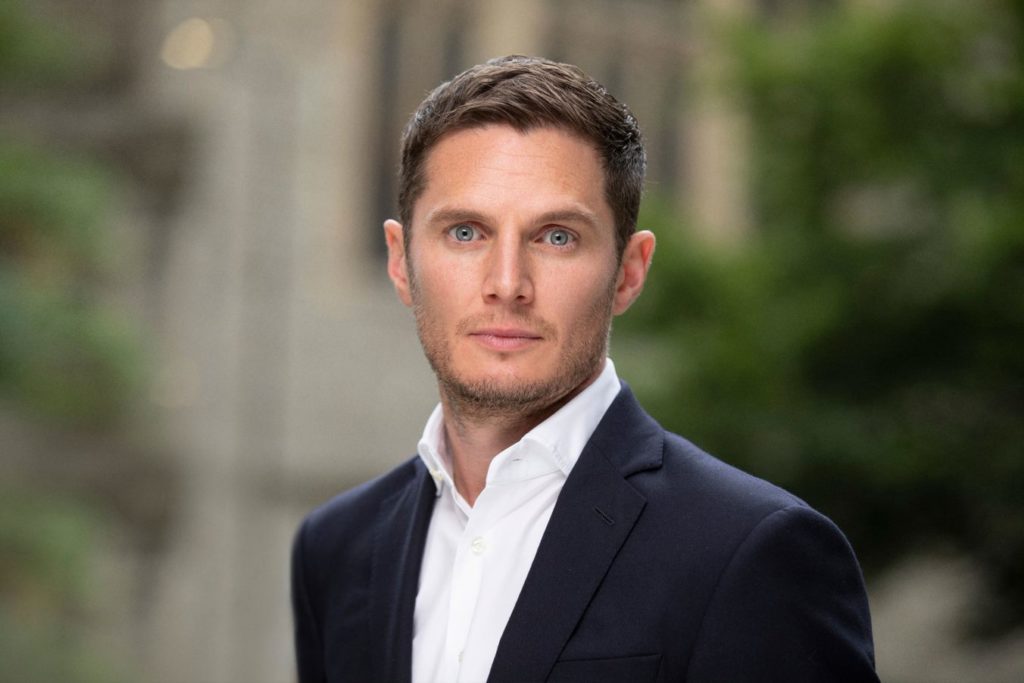Since this interview Global Reach has been acquired by Corpay
How did you get started in foreign exchange?
In 2005 four of us founded FC Exchange, then in 2010, I bought out two of the others. From then, my business partner, Martin Steenkamp, and I ran the business together until 2016. For 11 years, we grew FC Exchange, focusing on private client business, and then evolved to manage more corporate business and payments as well.
Inflexion Private Equity bought FC Exchange and Global Reach Partners in 2016, and we came together and formed Global Reach Group.
Why did you set up a currency brokerage?
I realised that there was a better way of doing things.
At the time, the barriers to entry were fairly low, in so far as there wasn’t anywhere near the infrastructure costs or the regulation that there are these days. The business was predominantly fuelled by customers taking the equity out of their UK properties as they wanted to buy overseas and currency was one of the key considerations for their overseas purchase.
As a currency broker, what does Global Reach do differently?
Firstly, we wouldn’t describe ourselves as just a currency broker.
We don’t apply a one-size-fits-all approach. Lots of people say that, but we have teams that are focused on SME, institutional businesses, and larger corporate businesses, which means we really understand the sector, scale, and challenges those clients face. We learn about those customers by talking to them, and tailor our approach accordingly. We also have departments dedicated to looking after private clients.
We’ve grown up with the regulation. We’ve always tried to stay ahead of what is required and do a bit more than we needed to do, which has stood us in good stead for increasing levels of regulation over the years. We invest a lot in that area, and always have, to ensure we comply with regulation.
We’ve evolved as a business as the industry has matured and have invested in technology as well. We also know the value of having core partner relationships and affiliates that we work with, as well as loyal corporate and private clients.
We understand the value of good service and a retained customer, whereas those that are just setting up and are in their infancy may not. It looks easy from the outside, but there’s a lot that goes into it.
We’ve got the liquidity, products, and proprietary technology, which position us as a leading FX broker.
What’s been your favourite part of running the business so far?
Seeing the growth of the business, and how individuals within the business have developed and been elevated.
Going into new territories is exciting as well. We enjoy what we do in the UK and have been able to expand that into Europe and Canada.
It’s a great compliment to our business that such numbers of customers choose, month on month, to use Global Reach. We have a fresh crop of new customers who decide to sign up with us as well as loyal clients that keep trading with us.
A large proportion of both our team and customers have been with us for a long time.
What’s the most challenging aspects of running a currency brokerage?
Probably the macro events, like the financial crisis, Brexit, and most recently, COVID. They can be more challenging to navigate, but what they do, is present opportunity. For example, whilst the Brexit process was drawn out and fairly painful, we’ve come out of it in a strong position, ahead of a lot of the competitors as we have been granted our European licences in The Netherlands.
During COVID, we took the opportunity to really focus on our business and expand our global footprint into Canada when the opportunity presented itself. So whilst these things create challenges, they can also present opportunity.
What’s the biggest mistake you think people make when it comes to transferring large amounts of money abroad or managing currency exposure?
I think it’s easy for people to get hung up on an exchange rate in an elevating market, working off the assumption that because they want an exchange rate to go higher and, in their favour, that it will do.
It’s important to take a step back and not lose perspective of where that exchange rate has been; is it a good level within recent history? Remember their time horizon and objectives.
We are here to help people manage foreign exchange risk. Our corporate clients are not making their money from foreign exchange, they want to make sure that they contain the risk and don’t lose money from currency market fluctuations.
What’s the most important thing people should consider when converting currency?
Think about your objectives. Do you need to do it? What’s your timeframe?
Choose a well-established provider that’s been around for a decent amount of time. You can take comfort in that— they know the market, and wouldn’t be around if they didn’t have longevity in their business.
Make sure the currency brokerage is properly licensed for what they are offering.
For individual transfers, don’t commit to a currency transaction before you know that you’re committing to a property, for example, because if you aren’t going to buy that house in France, you don’t need those Euros. Keep perspective on your circumstances and really figure out what your drivers are.
For corporate customers, be clear on budget levels – we help customers to work through that process, but ultimately, it’s their decision when determining their budgets.
Are you still transacting mainly large transactions over the phone or are you doing more and more online?
It’s a real mix.
I think particularly for some of our larger customers, or the more complex transactions, we prefer to deal with them over the phone. For example, if we’re dealing with hedging programs for FTSE100 companies, there’s quite a lot that goes into that, which can’t all be replicated online.
People take comfort in speaking to somebody as well. It may not be the largest transaction for Global Reach but it’s a large transaction for the customer that we’re dealing with, so we offer both mediums.
We also find that customers use our online offering for different things; monitoring their positions, looking at their portfolio, using it to execute payments, and so on.
A lot of customers use both our online and phone services, they don’t necessarily favour one or the other, and we offer both because people like the choice. Online is a growing medium; I think people are more and more comfortable with transacting online as well, as it’s become far more accessible.
Do you think we’re going to see any dramatic changes within the currency brokerage industry in the next few years?
I think that you’ll probably see an increasing amount of consolidation, because of the heightened levels of expectation from customers.
I also think that some of the smaller providers will find it more difficult with increasing regulatory pressures and demand for more progressive technology. We’ve seen quite a lot of rapid change in the last five years, with customers wanting more technology solutions. I think that will continue and that our industry is definitely seen as a more-than-viable alternative to the traditional bank route.
Our biggest competitors are still the banks, so I think that customer choice is one of the big changes we’ll probably see. As clients are educated towards the alternatives and the market continues to mature, you’ll likely see an increasing amount of customers move away from banks and traditional methods for currency transfers.
Do challenger banks provide a threat to currency brokers?
I think that pricing-wise, we can outstrip the challenger banks, so it’s good for the consumer. As more consumers flock away from traditional banks, it becomes better for the industry and helps drive innovation, so we welcome their participation.
They’re trying to offer lots of things all at once, and if you do that, the question becomes, can you do any of them well?
They’re moving into finance and lending products, foreign exchange, and bank accounts; at what point does a challenger bank just become a bank that people have moved away from?
We have customers that bank with challenger banks and use us for foreign exchange, but I’m sure they’ve got plenty of happy customers that stay with them for all their services. Indeed, you may see consolidation with some of those challenger banks themselves within the industry and in adjacent industries.
Nicholas Fullerton is CEO of Global Reach Group, a foreign currency and international payments provider.

Richard is the founder of the Good Money Guide (formerly Good Broker Guide), one of the original investment comparison sites established in 2015. With a career spanning two decades as a broker, he brings extensive expertise and knowledge to the financial landscape.
Having worked as a broker at Investors Intelligence and a multi-asset derivatives broker at MF Global (Man Financial), Richard has acquired substantial experience in the industry. His career began as a private client stockbroker at Walker Crips and Phillip Securities (now King and Shaxson), following internships on the NYMEX oil trading floor in New York and London IPE in 2001 and 2000.
Richard’s contributions and expertise have been recognized by respected publications such as The Sunday Times, BusinessInsider, Yahoo Finance, BusinessNews.org.uk, Master Investor, Wealth Briefing, iNews, and The FT, among many others.
Under Richard’s leadership, the Good Money Guide has evolved into a valuable destination for comprehensive information and expert guidance, specialising in trading, investment, and currency exchange. His commitment to delivering high-quality insights has solidified the Good Money Guide’s standing as a well-respected resource for both customers and industry colleagues.
You can contact Richard at richard@goodmoneyguide.com


